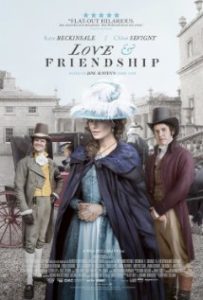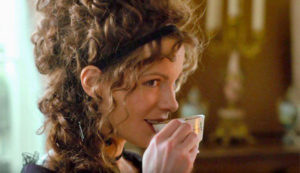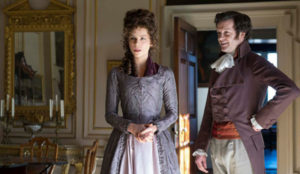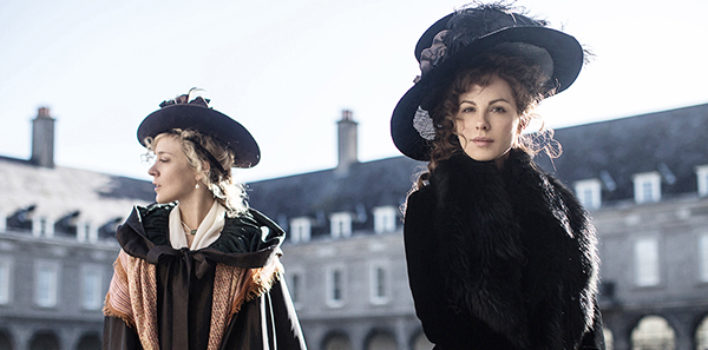Review| Love & Friendship
 Neither love nor friendship are quite what one would expect in this 2016 adaptation of Jane Austen’s novella Lady Susan. Neither is Lady Susan herself, the heroine, who one might hesitate to call heroic.
Neither love nor friendship are quite what one would expect in this 2016 adaptation of Jane Austen’s novella Lady Susan. Neither is Lady Susan herself, the heroine, who one might hesitate to call heroic.
Lady Susan is an enigma. Just when you think you have her figured out, she surprises. Is she an unconscionable flirt, ruthless gossip, and neglectful parent? Or a powerless widow, intelligent woman, and concerned mother? Our understanding of her is woven mostly out of the film’s dialogue—things said about her, or things she says about herself. We are never given a moment alone with her to deduce the naked truth. Even the end of the film manages to leave us more baffled by the question of her character than ever before.
Throughout the film, we witness affection of all sorts between the characters of this story: these relationships are recognizable versions of love. By comparison, the love that Lady Susan has for her daughter is not something we might easily categorize as such. We see Lady Susan keeping Frederica in a boarding school, trying to force her to marry a foolish man, and distancing her from the doting affection of relatives.
 Despite her bad behavior in these and other instances (some which are far, far worse!), Lady Susan’s actions are perhaps understandable. She is a widow with a daughter to support, homeless, and completely reliant on the good graces of relatives, and in particular the men in her life: what they think of her, or what they are willing to give her. Lady Susan’s choices are influenced by her environment and the limitations it holds for her sex, but she is also a ruthless woman. She is aware of the implications of her actions, often making statements that show how conscious she is of the way people view her, but that does not by any means make her stop.
Despite her bad behavior in these and other instances (some which are far, far worse!), Lady Susan’s actions are perhaps understandable. She is a widow with a daughter to support, homeless, and completely reliant on the good graces of relatives, and in particular the men in her life: what they think of her, or what they are willing to give her. Lady Susan’s choices are influenced by her environment and the limitations it holds for her sex, but she is also a ruthless woman. She is aware of the implications of her actions, often making statements that show how conscious she is of the way people view her, but that does not by any means make her stop.
Each viewer must deduce for themselves Lady Susan’s motives and the quality of her love, but I can’t help but see in her an example of the kind of substitution that is central to the Christian story. She never once lets up on pursuing the goal in her cross-hairs, regardless of how immoral her actions or choices. The growth and improvement of her character would have been more noble pursuits, but the truth of the matter is that the end of the story finds Frederica incredibly happy and secure, highly regarded by everyone, her honor pristine. It is hard not to see a correlation between Frederica’s gain and Lady Susan’s loss. I don’t mean to say that sin is excusable, or that we should not be held accountable for our actions. However, there are notes in the flavor of Lady Susan’s love for Frederica that are reminiscent of Christ, who gave up all the riches of his birthright to condescend for our benefit.
 The story is populated by dramatic characters and the film embraces this, framing them in a way that gives them credibility and believability. The timeline of the film is a bit obscure, jumping from conversation to conversation simply with shots of facades to give you place, and not much to give you a sense of time. But although there was a brief period in which I found my mind wandering, the over-the-top drama is laugh-out-loud funny. The characters and the actors who play them are delightful—particularly Tom Bennet as the air-headed Sir James Martin. Kate Beckinsale completely embodied Lady Susan, delivering even (or especially) her most absurd lines remarkably straight-faced.
The story is populated by dramatic characters and the film embraces this, framing them in a way that gives them credibility and believability. The timeline of the film is a bit obscure, jumping from conversation to conversation simply with shots of facades to give you place, and not much to give you a sense of time. But although there was a brief period in which I found my mind wandering, the over-the-top drama is laugh-out-loud funny. The characters and the actors who play them are delightful—particularly Tom Bennet as the air-headed Sir James Martin. Kate Beckinsale completely embodied Lady Susan, delivering even (or especially) her most absurd lines remarkably straight-faced.
Overall, Love and Friendship offers a hilarious and engaging look at just that: the every-day affections of our lives, and the stuff of which they are made. I highly recommend this film.








Thank you! This was a great post and gives me lots of food for thought. I was curious about this film, having no idea of it coming out until it was in theaters, and I’m a big Jane Austen fan! I’ve heard only good things about it, and from your review, it sounds like it has a lot of different layers in regards to Lady Susan’s character. If I can’t make it to the theaters, I’ll definitely be watching this on DVD!